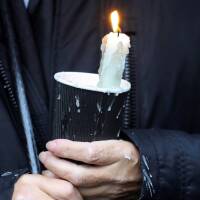Facing COVID-19 and Climate Threats, Nairobi Ramps Up Green Efforts
This story was originally published August 14, 2020 by the Thomson Reuters Foundation.

NAIROBI, Aug 14 (Thomson Reuters Foundation) - Peter Njeru used to live in central Nairobi's rundown Michuki Memorial Park because he had nowhere else to go. Now the 28-year-old is restoring and guarding the green space, one of about 200 jobless former park residents hired to help with the work.
"This park was my home with other street families, though people were dumping here illegally," he said, noting that he used to collect and sell plastic bottles and metal scraps to buy food.
But after being evicted in 2017, he was hired for a few months to help clear trash in the park — and began guarding it in his spare time.
Now he has a full-time job keeping clean the once trash-choked Nairobi River that runs through the green space, earning enough to rent a house for himself and his family.

Kenya's capital city is one of the fastest-growing in sub-Saharan Africa, according to the United Nations, and more people, trash and homelessness have taken a toll, along with new challenges like the COVID-19 pandemic.
More on the impact of COVID-19 around the world
But a government effort to better protect and restore parks in the city — particularly along the Nairobi River — is now having a significant payoff, not just in jobs but in green spaces to beat the heat and cope with virus restrictions, backers say.
The effort is part of a broader push to expand green infrastructure in Kenya's capital, including ensuring widened road corridors have good sidewalks and drainage to prevent flooding, as well as more trees.
Maurice Kavai, an environmental compliance officer with Nairobi City County government, said such changes, including better water service and waste management, will help residents cope not just with the coronavirus crisis but with worsening climate change impacts and future pandemics.
Already it's improving air quality and making the city a more pleasant place to work, said Loyd Ngere, a carpenter who sells wood furniture near expanded sidewalks along the road to Ngong.
The roadside is much less dusty, he said, and "my wares are visible to customers who often pass by because many people prefer walking due to good and safe pedestrian sidewalks."

The effort to improve Michuki Memorial Park began in March, when the government allocated 30 million Kenyan shillings ($278,000) to rapidly rehabilitate the park to create more green space for social distancing, said Julius Wanjau, who runs Nairobi's central business district.
"Early this year, the place was a criminal hideout, a (space for) illegal charcoal dealing, a dumping site, a home to many street families in Nairobi," he said, with evicted families continuing to move back into the park.
But since the park was again cleared, 1,200 tons of garbage removed, and other improvements made, "now the place is clean with cool air and you can even find fish in the Nairobi River, which were never there before", Wanjau said.
By asking former residents of the park what they wanted to see change, and giving them priority doing casual work to improve it, the project has also created what Wanjau calls "ambassadors" for the green space, committed to protecting it.
"They understand this place," he said.
The timing of the work also has, coincidentally, helped cushion many of the city's most vulnerable families economically through the city's pandemic lockdown, providing work as other jobs dried up.
Phillip Dinga, who works for the C40 alliance of cities pushing for climate action and advises Nairobi officials, said the kind of changes Nairobi is making are crucial across Africa, both to cater for swelling urban populations and cut disaster risks.

Carrying out such work is a good way to use government spending to spur economies trying to recover from the COVID-19 economic slowdown as well, he said.
"We want to transition Nairobi to a world-class resilient city," he said, including with air quality that meets World Health Organization standards.
Nairobi is moving towards that both by installing air quality monitors and working to make non-motorized transport — such as walking and cycling — easier and more pleasant, Dinga said.
Clement Ngoriareng, of the Kenya Forest Service, said his agency and others also are trying to identify more open spaces in the city that could be managed as urban forests to provide cooling, fresh air and recreation spaces.
Chris Kiptoo, principal secretary in the Ministry of Environment and Forest, said green, environmentally smart policy was key to both making cities more liveable and recovering effectively from the virus slowdown.
"The solutions lie with us," he said during an online event, particularly in terms of finding "a deal that balances nature and people."
Reporting by Wesley Langat ; editing by Laurie Goering.





